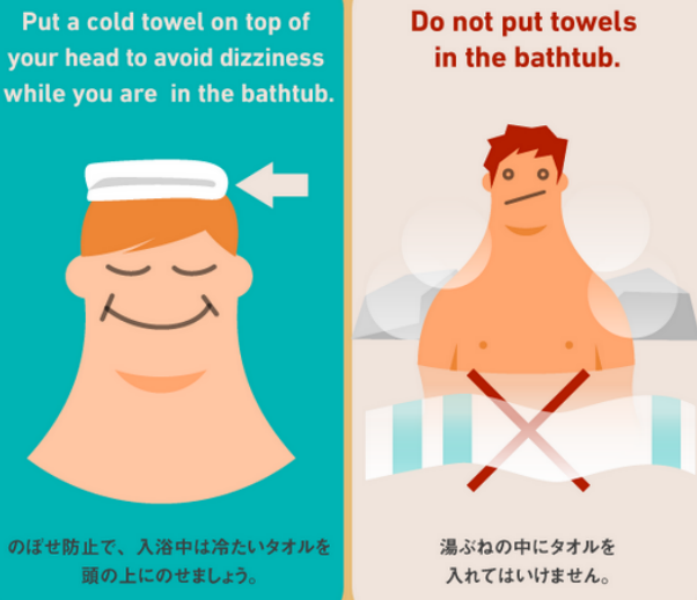This text could comprise affiliate hyperlinks the place I make a small fee for purchases you make from hyperlinks that you simply click on from this text. By buying by these hyperlinks, you help me at no extra price to you. Thanks on your help.
Once I landed in Japan for the primary time, I anticipated sushi, temples, neon indicators, and a ridiculous variety of merchandising machines. And whereas I did discover all of that (plus extra sorts of KitKats than I ever imagined attainable), what actually stood out had been the refined — and not-so-subtle — guidelines of social habits in Japan, typically fully shocking to a first-time customer.
Japan isn’t simply one other nation — it’s a complete system of customs, etiquette, and unstated social contracts that appear to function like clockwork. I’ve traveled to over 75 international locations, however the first time I traveled to Japan, it baffled me. It’s the one extremely developed nation that I’ve been in the place every part is so fully international to me. I’m used to that feeling when visiting extra underdeveloped international locations, however I wasn’t anticipating the “Why do they try this” thought that ran by my head consistently in Japan.
If you happen to’re questioning what to do (and never do) in Japan, this information is your etiquette cheat sheet. These cultural ideas for visiting Japan cowl what you’ll encounter in each the bustling streets of Tokyo and the quiet alleys of smaller cities, the place the merchandising machine is perhaps the one factor awake previous 9 p.m.
16 Methods to Not Look Like a Vacationer in Japan
Prepared to start out your crash course in not wanting like a clueless vacationer in Japan?
1. Sneakers Off — Slippers On
In Japan, taking your footwear off is virtually a reflex. Properties? Completely. Conventional inns (ryokans)? After all. Some eating places, temples, dressing rooms, museums, and even becoming rooms? Sure, sure, and doubtless sure.
Uncover the 88 Temple Pilgrimage in Shikoku, Japan’s hidden gem!
And simply while you’ve lastly gotten the dangle of swapping your sneakers for slippers, you’ll encounter rest room slippers — a particular pair that lives contained in the restroom and nowhere else. You’ll 100% neglect to alter again in some unspecified time in the future and wander into the eating room in bathroom footwear. Welcome to the membership.
Metropolis Tip: In Tokyo, many locations are a bit extra relaxed. However in smaller cities? They take this significantly. Search for a step up, cubbies, or a pile of slippers — it’s your cue to take your footwear off. AND…pack footwear which are simple to slide on and off, you’ll positively thank me for that tip.



2. Don’t Eat and Stroll
Japan has a few of the greatest avenue meals on the planet… and but, consuming whereas strolling is taken into account impolite. One of many quickest methods to sign “I’m not from right here” in Japan is to walk down the road chomping on a snack. Despite the fact that meals is in all places — from comfort shops to these superb division retailer basements — consuming is taken into account one thing you pause for.
You’ll typically discover a small bench or perhaps a marked-off space to face and eat close to the place you purchased the meals. The toughest half for me is to not stroll and eat an ice cream cone on the identical time…it simply appears pure to do, however not in Japan!
Countryside twist: In smaller cities, individuals may give you snacks on a hike or throughout a go to — pause, smile, eat, and don’t shove it in your pocket for later.
Every little thing that you must learn about climbing the Kumano Kodo in Japan
3. You’ll Carry Your Trash Like a Memento
Japan is remarkably clear. However there’s a secret: public trash cans are virtually legendary creatures. You’ll hardly ever discover one, particularly exterior of main practice stations or comfort shops. Baffled but?
Locals merely carry their trash till they get dwelling. You’ll too. Simply embrace it.
Professional Tip: Carry a small plastic bag in your daypack for trash. While you lastly discover a bin (often close to merchandising machines or comfort shops), put together to kind like your life is determined by it.
4. Transit Etiquette: Silence is Golden
The Japanese subway is a masterclass in quiet effectivity. No telephone chatter, no blasting music, and positively no backpack-swinging chaos.
Right here’s how to not get side-eyed:
- Silence your telephone (they even name it “method mode”)
- No voice calls — ever
- Type an orderly line on the practice doorways — don’t crowd or shove.
- Let individuals off earlier than you get on. Appears apparent, however value repeating. (It doesn’t work like this in the remainder of Asia…Japan is totally different.
- Maintain conversations to a whisper, particularly on Shinkansen (bullet trains)
- Take backpacks off your again throughout busy instances
- Precedence seats exist – don’t use them should you’re wholesome and in a position.

Escalator Etiquette: Tokyo = stand on the left. Osaka = stand on the appropriate. As a result of… Japan loves a curveball.
8 Locations to Uncover in Japan off the Overwhelmed Path
5. Slurp Like You Imply It (However Don’t Stab Something)
Let’s speak about meals etiquette. To start with, don’t tip (extra on that under). However past that, listed here are some refined guidelines that may shock you:
- Slurping noodles will not be impolite — in actual fact, it’s inspired. It’s an indication you’re having fun with your meal.
- Don’t stab meals with chopsticks. Use them like tweezers, not skewers.
- Don’t stick chopsticks upright in rice — it resembles a funeral providing.
- Don’t move meals chopstick-to-chopstick — additionally symbolic of funeral rites.
- Many small eating places or izakayas (bars) will greet you with a moist towel (oshibori). Use it to scrub your arms, not your face or your chopsticks.
- Don’t pour soy sauce throughout your rice — it’s not a bowl of cereal. In reality, most Japanese don’t use soy sauce on their sushi…thoughts blown.


Principally, chopsticks are usually not mini spears. Use them gracefully — or ask for a fork. No disgrace.
6. No Tipping. Not Even a Little.
This can be a arduous one for Individuals: don’t tip in Japan. Not in eating places, not in taxis, not even for lodge employees. It’s not simply pointless — it’s complicated. If you happen to depart money, somebody could chase you all the way down to return it.
If you happen to really need to present gratitude, bow and say “Arigatou gozaimasu” such as you imply it.
7. Restaurant Guidelines You Didn’t Know You Wanted
Some Japanese eating places work a bit in another way:
- You may order from a merchandising machine earlier than you sit down. Don’t panic — simply match the meals picture and pay.
- Water and tea are often free. Typically self-serve.
- Don’t ask for substitutions — the chef is aware of what they’re doing.
- There could also be a small appetizer (“otoshi”) you didn’t order. It’s not a mistake. It’s a part of the expertise.
Small city twist: In countryside spots, English could also be restricted, and menus is perhaps handwritten in kanji. Smile, level, and use Google Translate’s digital camera function — it’s magical.
8. Yukata Etiquette: Methods to Rock the Gown Like a Native
A yukata is a light-weight cotton gown that you simply’ll typically be given at ryokans (conventional Japanese inns), onsens (scorching spring baths), and even some lodges. Consider it as Japan’s reply to a bathrobe — however with centuries of custom.
The yukata is supposed to be comfy and sensible — one thing you’ll be able to put on to dinner, to the onsen, whereas strolling by a scorching spring village, or lounging in your room. Locals put on them prefer it’s probably the most pure factor on the planet. It would really feel bizarre to put on a gown to dinner at your Ryokan – however belief me, you’ll stand out extra in avenue garments than the yukata.

Right here’s the rule you don’t need to mess up: left aspect over proper while you wrap it closed. Proper-over-left is reserved for dressing the deceased, not the look you’re going for. Tie the sash (known as an obi) round your waist or hips. Ladies usually put on it a bit greater than males. You may also put on the little socks (known as tabi) and slippers supplied for the complete impact. And naturally, don’t neglect the slippers!
9. Go away Your Pajamas and Toiletries at Dwelling
One in every of Japan’s underrated journey joys? The goodies are ready for you in your lodge room. Many Japanese lodges — even the budget-friendly enterprise sorts — present a full set of pajamas (often a smooth cotton or waffle-y button-up set) and a formidable array of toiletries. We’re speaking toothbrushes, razors, combs, hair ties, bathe caps, and generally even face lotion and toner.
Don’t be shy — they’re there for use. Locals anticipate you to put on the pajamas whereas lounging round your lodge room or heading to the shared onsen/tub, and also you’ll typically see different friends doing the identical. It’s half consolation, half tradition, and actually, it saves area in your suitcase.


10. Take a Seat within the Bathe
And whereas we’re speaking bogs, let’s chat lodge showers. You may stroll in and suppose: “Why is there no curtain? And why is there a stool?” Relaxation assured, it’s all a part of the plan. Japanese bogs are often designed as moist rooms, that means it’s okay (and anticipated) for water to get in all places. The ground has a drain, so don’t panic.
That small plastic stool and hand-held bathe head? They’re there so you’ll be able to sit and wash totally earlier than hopping within the tub (if there’s one). Sitting is customary and helps forestall splash zones.
Professional tip: Don’t neglect your towel earlier than moving into. When you’re soaked and slippery, stepping out to seek out it will get… entertaining.
11. Be taught a Few Phrases — Folks Discover
You don’t want to talk Japanese to get pleasure from Japan. However studying only a handful of phrases will go a lengthy method:
- Konnichiwa – Hey
- Arigatou gozaimasu – Thanks very a lot
- Sumimasen – Excuse me / sorry / attention-getter
- Oishii! – Scrumptious!
- Eigo o hanasemasu ka? – Do you communicate English?

Even when your pronunciation is off, the trouble is appreciated. And when unsure, bow and smile.
12. Bowing Is a Manner of Life
The bow is the last word type of politeness in Japan. Greeting, thanking, apologizing — it’s all within the tilt.
You don’t have to bow deeply — only a small respectful nod is sufficient. And should you’re unsure how you can reply? Bow anyway. You may’t actually overdo it. As a foreigner, nobody expects you to get it completely, however making the trouble goes a good distance.
Countryside etiquette: In small cities, bowing is extra frequent and sometimes replaces phrases. Lean into it.
13. Onsen Etiquette: Bare and Afraid (However You’ll Survive)
Public baths (onsen) are a part of Japanese life, and they’re one in all my favourite cultural issues to do. First time? Awkward. Second time? Magical. Nevertheless, they arrive with strict guidelines:
- Bathe and wash totally earlier than getting into the bathtub
- No swimsuits — you’re moving into bare
- Tattoos might not be allowed (although an increasing number of locations now allow them — examine first)

What’s the Cope with the Tiny Towel in Onsens?
Ah, sure, the mysterious little towel you obtain at an onsen — the modesty material that doesn’t cowl a lot in any respect. It’s in regards to the measurement of a visitor hand towel, and it comes with its personal set of unstated guidelines:
- It’s not for bathing – This isn’t your washcloth (although it appears like one). Use the showers earlier than getting into the onsen to correctly clear your self (cleaning soap, shampoo, the entire routine), however depart the little towel dry.
- Don’t let it contact the water – That towel ought to keep out of the bathtub. You’ll typically see locals folding it neatly and putting it on their head or leaving it on the aspect of the bathtub. Floating it within the water is a giant no-no.
- It’s for modesty… type of – Strolling to and from the bathtub, you’ll be able to maintain it in entrance of you for just a little protection, however let’s be sincere — nobody’s actually fooled.

Professional tip: After your soak, you need to use it to dry off earlier than you seize the massive towel within the locker space. It’s your transition towel, not your drying towel.
14. Punctuality Is Sacred
Japan runs on time. I imply, actually on time. If a practice leaves at 3:17pm, it’ll depart at 3:17pm. Being late is taken into account disrespectful. I’m terrible at being punctual, so I actually have to observe myself after I’m in Japan! Get it…watch…
When in a giant Japanese metropolis, my rule is to only give myself heaps (and much) of additional time. The practice stations could be a labyrinth of confusion and folks, and I typically want further time to navigate them. If you happen to occur to get to your vacation spot early…then nice – you’ll be able to sit and folks watch (it’s a lot enjoyable in Japan!).
Journey tip: If you happen to’re on time, you’re already slicing it shut.
Small city perception: Buses and trains are much less frequent. Miss one, and the following could also be tomorrow.
15. Candy Items You’ll See All over the place
Present-giving is virtually a sport in Japan, and the MVP is meals. When individuals journey, it’s frequent to carry again regional snacks or treats, known as omiyage, to offer to coworkers, pals, or household. You’ll see elaborately wrapped packing containers of sweets at each practice station and airport, sorted by native specialties and color-coded with a stage of packaging perfection that’s actually awe-inspiring.



Even should you’re only a customer, this practice is value embracing. Bringing a small field of cookies or sweets when visiting somebody — even a lodge or information — is all the time appreciated. And don’t be shocked if a shopkeeper or host arms you a neatly wrapped deal with while you depart — that’s simply omotenashi (Japanese hospitality) in motion.
Professional tip: These make unbelievable souvenirs — and also you’ll get bonus factors should you carry one thing again dwelling that’s particular to the area you visited.
16. Goodbye Tip: The Artwork of the Infinite Wave
This tip will not be one that may make you look extra native, however as a substitute, only a heart-melting Japanese customized that’s good to learn about. The way in which individuals say goodbye in Japan within the journey sector is particular — with a wave that simply. retains. going. Whether or not you’re leaving a ryokan, saying farewell to a information, or watching a practice pull out of the station, anticipate a lengthy, honest wave — typically with each arms — that continues till you’re out of sight.
And sure, you’re anticipated to wave again. Then wave once more. And once more. It’s half politeness, half heat, and fully charming. You’ll end up doing it instinctively by the tip of your journey, and possibly even lacking it while you get dwelling.

The Apps That Will Make Japan Simpler
These apps and instruments will make life simpler as soon as we’re there — and make it easier to navigate every part from subways to menus to bathrooms with mysterious buttons.
- Google Translate (with Japanese offline)
Use the digital camera function to translate indicators, menus, or thriller onsen directions.
Apple | Android. - Suica App (for cellular transit card use — if in case you have a appropriate telephone)
Apple
Or carry a bodily Suica or Pasmo card you’ll be able to load on the airport. They work for many trains, buses, and even comfort shops. - Google Maps
That is my lifesaver app for Japan. I take advantage of it for every part – strolling instructions, subway/practice platforms, selecting eating places, and discovering the closest merchandising machine with scorching espresso in a can (sure, that’s a factor).
Remaining Ideas: Effort Is Every little thing
Right here’s the factor about Japan — you’re not anticipated to get all of it proper. You’re a visitor. However individuals deeply admire it while you attempt. Smile. Say thanks. Discover the silence. Carry your trash. Be curious.
And should you’re coming with me on one in all my small group Japan excursions? Even higher. I’ll be proper there that will help you navigate chopsticks, bathroom slippers, merchandising machines, and the rest this stunning, advanced, endlessly well mannered nation throws our method.
Let’s go get awkward, curious, and amazed — collectively.



